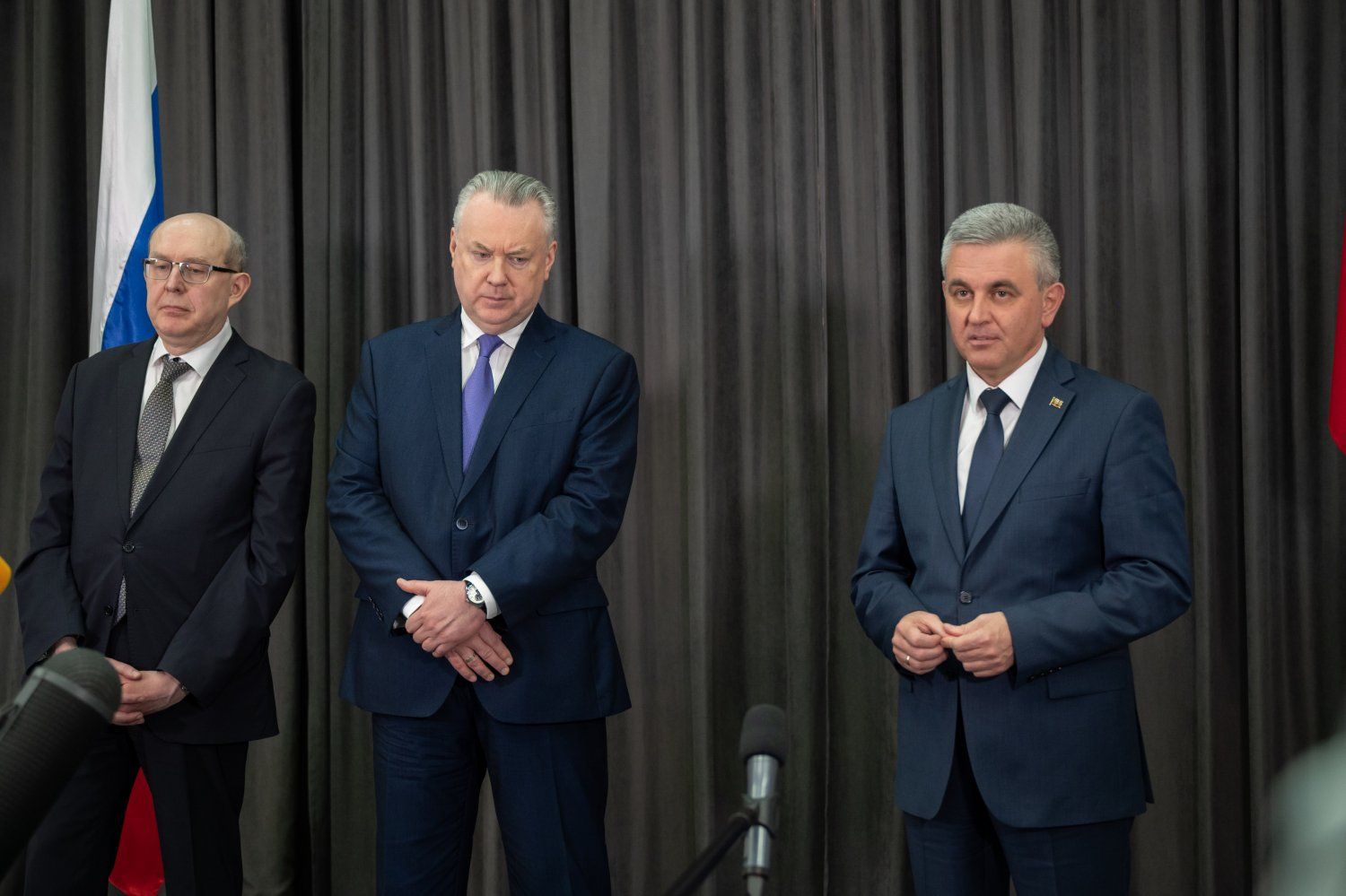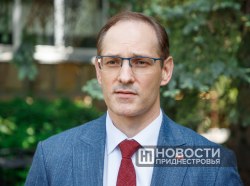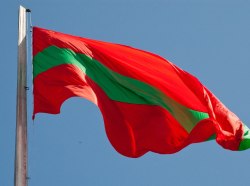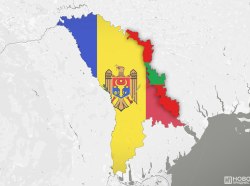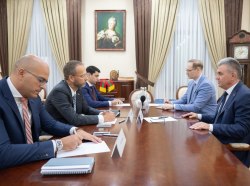Alexander Lukashevich, Permanent Representative of the Russian Federation to the OSCE:
Good afternoon. We arrived in Tiraspol with interesting thoughts and ideas. I am the Permanent Representative of Russia to the Organization for Security and Cooperation in Europe. We have an inspection visit related to the activities of the Mission, which is located in Moldova, but works on both banks of the Dniester. The issue of extending this Mission was decided at the end of last year. We had a lot of concerns about the work in accordance with the mandate. We were able to extend the mandate of this Mission only for six months (we were asked for a year) – taking into consideration the current difficult situation in the Pridnestrovian settlement and our concerns, which we very clearly explained to the leadership of the Mission. Especially since the leadership has changed, a citizen of the United States, Mrs. Keiderling now. She treats this issue with understands. We held consultations yesterday in the Mission with a request to share concrete impressions and plans on how it works in accordance with its mandate.
Another extension is on course at the end of June, so our trip is mainly to decide and analyze how useful the Mission is from the point of view of both banks of the Dniester. Today there was a meeting with the leadership of Pridnestrovie. We are interested in the Pridnestrovian position. This Mission is the oldest of the OSCE field presences, established back in 1993. It is clear that over this long period of time the tasks of the Mission have changed, the regional context has changed dramatically. We tried to answer lots of questions. I am grateful to my interlocutors today for frankly sharing their thoughts with us, especially since the OSCE Chairman-in-Office Mr. Osmani recently visited the region.
The emphasis of the leadership from both banks of the Dniester was important to us in the general context of the work of the Organization on the Moldovan-Pridnestrovian dossier. We consider our visit (it has not been over yet, discussions will continue) very useful in terms of correct assessments of the readiness of the Organization and its presence on the ground to fulfill the tasks that were set by all fifty-seven OSCE participating States. It is clear that many questions look a little different from Vienna. Therefore, this visit in a practical sense enriched us greatly.
Vitaly Tryapitsyn, Ambassador-at-Large of the Ministry of Foreign Affairs of the Russian Federation:
Good afternoon. I am now in the region as part of a traditional trip to compare notes on the Pridnestrovian settlement. There were interesting and informative discussions on this topic in Chisinau yesterday. They continued in Tiraspol today.
The situation is not easy, of course. The “5 + 2” format is not working now as you know for objective and subjective reasons. There are no special results so far, as far as it is seen from Moscow, and in the work of expert (sectoral) working groups. All these topics are discussed in detail. There are questions about the situation in the Security Zone, about the general situation in the region. Therefore, the exchange of views and the opportunity to draw direct assessments are very important in order to outline actual steps to give impetus to the settlement process.
Vadim Krasnoselsky, the PMR President:
Meeting with Russian colleagues, with colleagues from the OSCE mission took place. I will say that it is very timely. Why? All of you know perfectly well what we have faced literally in recent weeks. This is an attempt to attack Pridnestrovie with terrorist methods, by setting explosive mechanisms into action for the mass death of people. The criminal case is being investigated to date, new defendants appear, new evidence appears. The most important thing is that I personally and the investigation, everyone who was involved in solving this crime, now have an answer to the question, why was this done? Two terrorist attacks that we know that did not take place (this is a terrorist attack in the city of Tiraspol against officials with mass death of people who would have been at the center of this explosion, and an attack on the OSCE mission on February 14 this year) were aimed at discrediting namely the Russian Federation, to discredit the peacekeeping mission of the Russian Federation. Even if Russia would not be directly accused of organizing these terrorist attacks, but the fact that they would accuse the Russian peacekeepers of inaction, that they cannot physically ensure peace on earth, cannot ensure the lives of people, especially of such a representative OSCE Mission, would be a fact, of course. This in my opinion would be a powerful reason for Moldova to announce its withdrawal from the agreement of 1992. Although even without this, such thoughts already exist. Attempts are already being made to throw this possibility, so to speak. What was prevented thanks to the efforts of the security agencies of Pridnestrovie had this goal. Thank God that this happened, and we did not allow discrediting either the peacekeeping mission or the Russian Federation in this part. No matter how difficult it is, we must speak, we must move forward.
A very important point to which I would like to draw your attention is that our salvation is in our openness. What we are investigating will be known to everyone – both to the Pridnestrovian people, and to Western politicians and other politicians. Everyone will know the truth about what happened. We are completely open to inquiry. As the PMR Prosecutor previously stated, we are ready to receive any special services of foreign states and familiarize them with the case materials and the evidence that is available today. As you know, facts are stubborn things. I will tell you this: complete denial means only complete acceptance of the facts that really exist from the point of view of both legal practice and law enforcement psychology. Therefore, those politicians who deny everything, they definitely know everything, understand everything and recognize everything. But for now, they're profitable. We will be open to the press, to all special services, prosecutors, law enforcement systems of states that express a desire to get acquainted with the documents and obtained evidence in the future, when investigating this grave crime, this terrorist attack, this sabotage.
If we are talking about the OSCE Mission, I place special hope on it. I consider the Mission useful here in Pridnestrovie. I consider that it is useful for further negotiations between Pridnestrovie and Moldova on the issues that are on the agenda. This is both "Berlin" and "Berlin +". There are new issues that need to be discussed. The only thing that does not satisfy me is that the negotiations conducted by political representatives, the work that is being carried out in the working groups, is nothing but an imitation. I don't see any results. The issues are not resolved. Therefore, I welcomed the participation of Mr. Osmani, who is the OSCE Chairman-in-Office and Foreign Minister of North Macedonia. He proposed to convene the “5+2” format in Skopje, Macedonia, or to convene some other format on security, regional security, common security, which undoubtedly includes Pridnestrovie. This idea of Mr. Osmani resonated with us. We are ready to continue the dialogue in any format – for the sake of peace in the Pridnestrovian land. The foundation is peace.
Of course, the topic of our discussion was that notorious law on separatism. This is absolutely incomprehensible, absolutely political – as a method of pressure on Pridnestrovians. By the way, big Moldovan politicians say that Pridnestrovians will be more accommodating thanks to this law. That is, they directly say that this is a method of pressure. Of course, it cannot bear any prospects for the Moldo-Pridnestrovian settlement. You will never reach the truth by pressure.
We talked with colleagues about the continuation of the work of the consular service point in Pridnestrovie, of course. This is a big problem for Pridnestrovians. 220 thousand citizens of the Russian Federation live here, who have the constitutional right to receive relevant documents, not only a passport. There are a lot of documents that Pridnestrovians must receive here. The problem must be solved. There are objective and subjective factors. This is all clear. You can’t explain to people who are standing in line, that’s the problem.
Naturally, we also talked about the Pridnestrovian-Russian interaction. We are connected by a common history, a common culture, a common language – one of the official languages. All this needs to be developed, of course. Economic ties are also subject to development. The meeting was certainly interesting and productive.

